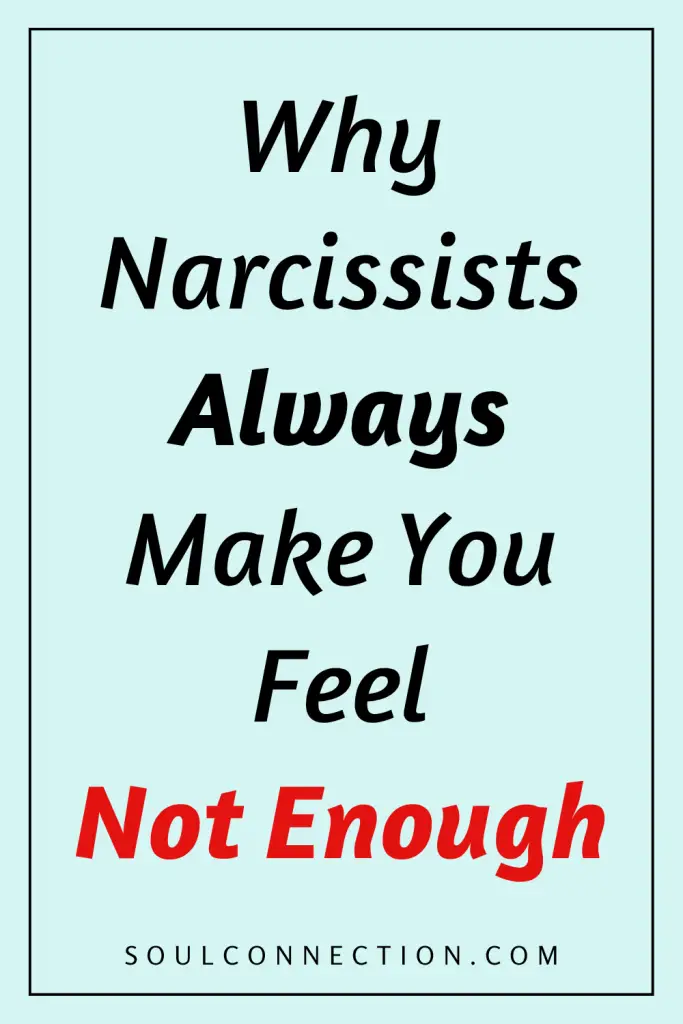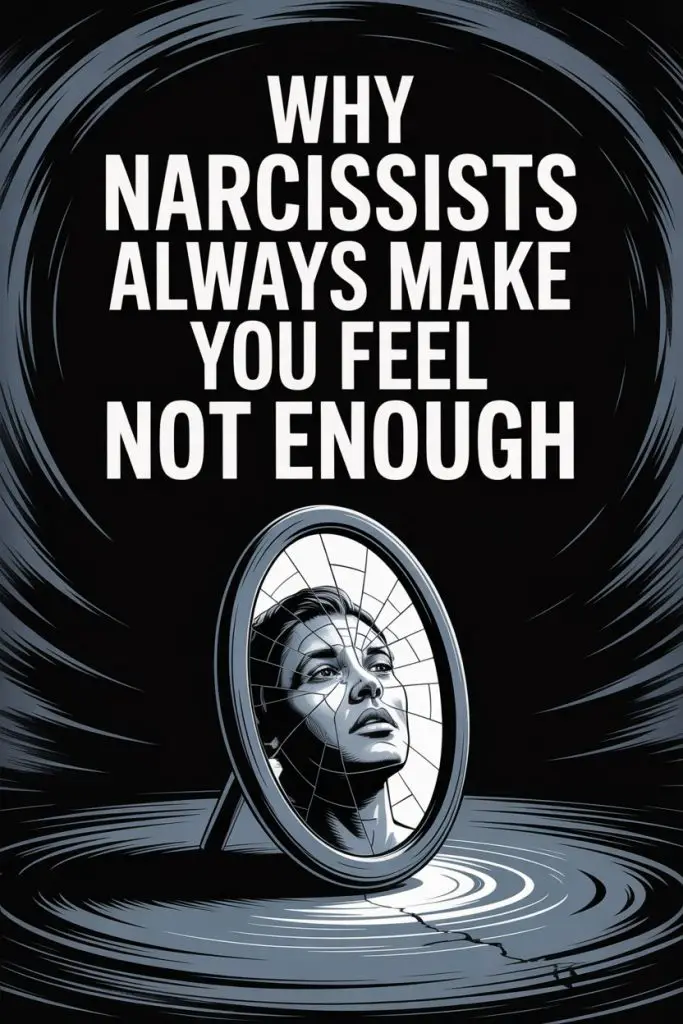Ever tried to fill a bottomless pit? Loving a narcissist can feel a lot like that—never-ending effort, zero satisfaction, and the sinking suspicion you’re being set up for failure.
You start out hopeful (and possibly a little smitten) but soon find yourself questioning your worth, your sanity, and why you’re apologizing for breathing too loudly.
It’s not your imagination. Narcissists have a nearly magical ability to turn loving, competent, and generally fabulous people into self-doubting puddles.
Here’s why your best is never enough for someone who refuses to be satisfied.
The Rules Keep Changing
If you’ve ever felt like you’re auditioning for a part you already won, but the script keeps changing, welcome to life with a narcissist. One day, you’re told you’re too needy. The next? Not attentive enough.
Yesterday’s “perfect dinner” is today’s “why’d you burn the toast?” performance review.
Moving goalposts are a favorite hobby for narcissists. They thrive on unpredictability: it gives them control and keeps you off-balance.
You’re always scrambling to guess what they want next, which is exactly where they want you—unsure, anxious, and ever more desperate to please.
Love Bombing: The Opening Act
Ah, the charm. Narcissists are often masters of flattery and grand gestures, especially early on. You feel adored, seen, maybe even a little swept off your feet.
But here’s the catch: love bombing isn’t about you. It’s about setting a hook.
The affection is conditional, and once you’re invested, the warmth turns icy. Suddenly, you’re on trial for infractions you didn’t know existed.
Those compliments get replaced with criticisms, and you spend the rest of your relationship trying to win back the love you were drowning in just weeks ago.
Comparison Is Their Love Language
Ever had your best efforts compared to an ex, a coworker, your partner’s mum, or even random strangers? Narcissists are fluent in the language of comparison.
It’s how they keep you striving—and keep themselves perched atop a homemade pedestal.
No matter what you do, someone, somewhere, is doing it better (according to them). The result? You start doubting your choices, your skills, and your very self, all while ignoring the blaring alarm bells about their behavior.
The Criticism Never Ends
Constructive feedback can be a gift. Narcissistic criticism? Not so much. Every conversation is an opportunity for them to point out your flaws.
Missed a call? Clearly, you don’t care about them. Planned a surprise? You should have known they hate surprises.
This relentless nitpicking erodes confidence, leaving you constantly second-guessing yourself. It’s not about helping you grow; it’s about shrinking you down to size—specifically, a size that makes them look bigger by comparison.
Gaslighting Is Their Superpower
Ever found yourself apologizing for things you didn’t do, or questioning whether your memory is faulty? Gaslighting is a narcissist’s bread and butter. It’s manipulation designed to make you doubt your perceptions, your feelings, and even your reality.
They’ll insist conversations never happened, feelings weren’t expressed, promises weren’t made—no matter how vivid your memory.
Over time, you start to trust your partner’s version of events more than your own. The result: you feel off-balance, and, yes, not enough.
Your Needs Are an Inconvenience
Expressing needs in a healthy relationship is normal. With a narcissist, needs are a threat to their control. Try asking for anything—time, attention, support—and the response is often irritation, dismissal, or even outright ridicule.
You start shrinking your needs, making yourself smaller, hoping it’ll earn you some affection. Spoiler: it won’t. The less you ask for, the less you get, and the cycle continues, with you feeling empty and unworthy.
They Take Credit and Deflect Blame
Achievements? That’s suddenly their win. Mistakes? Must be your fault. This pattern keeps you locked in a loop, always striving to prove yourself and repair problems you didn’t cause.
Over time, you internalize the message: you’re responsible for the relationship’s success or failure. The narcissist, meanwhile, remains blissfully blameless, while you carry the emotional load.
Emotional Withholding Is a Weapon
Ever felt like your partner is withholding affection, conversation, or even basic acknowledgment as punishment? Narcissists use emotional withholding to keep you chasing after their approval.
That cold shoulder or silent treatment sends a loud message: your love is conditional, and you’d better work for it. You start working overtime to win them back, forgetting you deserve mutual respect and affection in the first place.
Your Success Threatens Them
Most partners cheer your wins. Narcissists see them as competition. If you shine too brightly, they feel dimmed by comparison.
Instead of celebrating your achievements, they minimize them, change the subject, or, in true passive-aggressive fashion, sulk.
The unspoken lesson: shrink yourself or risk losing their affection. No wonder you start second-guessing your successes, almost apologizing for having dreams or ambitions at all.
Apologies Are a One-Way Street
Ever notice how you’re always the one extending the olive branch, even when you’re not at fault? With a narcissist, apologies are as rare as a sunny bank holiday in January.
If you’re waiting for accountability, you might want to bring a packed lunch.
This lopsided dynamic fuels the feeling that you’re never quite good enough. If only you were more patient, more understanding, more…something…then maybe they’d finally treat you right.
They Rewrite History
If you ever confront a narcissist about their behavior, expect a creative retelling of events. Suddenly, you’re the villain, and their actions were just innocent responses to your imagined offenses.
This tendency to rewrite history keeps you tangled up in self-doubt. Did you really overreact? Were you too sensitive? It’s a mind-bending game, designed to keep you apologizing for things that never happened.
You Become Addicted to Their Approval
It’s no accident. Narcissists know how to dole out just enough kindness or praise to keep you hooked. One minute you’re being ignored, the next you’re showered with affection—for a moment.
This intermittent reinforcement (thanks, psychology textbooks) creates an actual addiction to their approval. Like playing the slots, you keep pulling the lever, hoping for a jackpot that rarely comes.
And each time you lose, you blame yourself, not the rigged machine.
Boundaries Are Seen as Betrayal
Try setting a boundary with a narcissist and watch the fireworks. Suddenly, you’re “selfish,” “cold,” or “not a team player.” Healthy boundaries threaten their control, so they’ll guilt-trip or punish you for asserting them.
You end up feeling guilty for wanting perfectly reasonable things—privacy, respect, personal time. The lesson? Your needs are too much, and your limits are a personal affront.
Why It Hurts So Much
None of this is accidental. The narcissist’s strategies are designed, consciously or not, to keep you striving for approval that never comes.
The result is a chronic feeling of not measuring up—a belief that if you could just be a little better, everything would finally click.
But it never does.
And that’s not a reflection of your worth; it’s a reflection of their emptiness.
The Way Out Starts with You
Escaping the cycle of not-enoughness isn’t easy, but it is possible. Here’s what works:
Get reacquainted with reality. Keep a journal. Write down what was said, how you felt, and what actually happened. Seeing things in black and white helps cut through the gaslighting fog.
Rebuild your self-worth outside the relationship. Spend time with people who see your value. Pursue hobbies or interests that remind you of your strengths.
Practice self-compassion. You’re not failing—you’re surviving a situation designed to make you question yourself. Treat yourself the way you’d treat a good mate in a tough spot.
Set boundaries—even if it’s scary. Boundaries are not selfish; they’re a requirement for emotional safety. You deserve to protect your time, your energy, and your heart.
Consider professional support. Sometimes, the best way out is with help. Therapists can offer perspective, validation, and coping strategies, breaking the cycle of self-blame.
You Were Always Enough
Narcissists thrive on keeping others small because they’re terrified of their own emptiness. If you’ve been feeling like “not enough,” it’s not a flaw in you—it’s a feature of their manipulation.
Your value doesn’t depend on someone’s shifting moods or impossible standards. You’re already enough, exactly as you are, even if a certain someone can’t—or won’t—see it.
Next time you catch yourself questioning your worth, remember: you never had to audition for love in the first place. The right people see you for the star you are. Curtains up.


